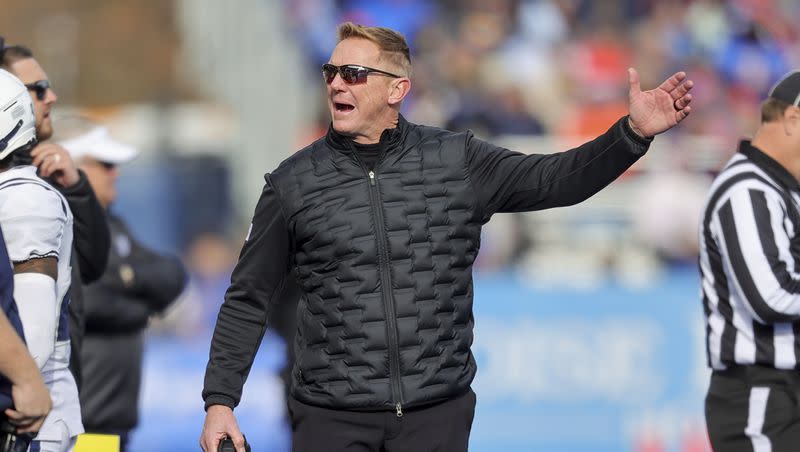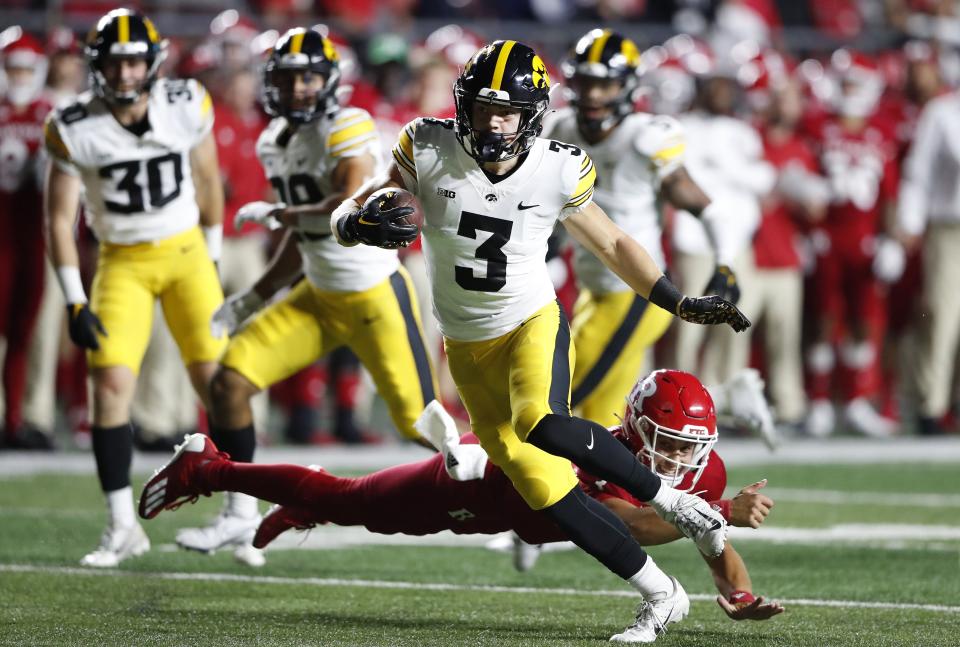What Utah State coach Blake Anderson thinks about college football’s new first-down clock rule

- Oops!Something went wrong.Please try again later.
One less offensive drive per game.
That is what Utah State coach Blake Anderson expects to be the impact of recent NCAA rule changes designed to speed up play and shorten game times — per The Sporting News, the average college football game took three hours and 21 minutes in 2022.
“Isn’t there a mandate everywhere in the country to score more points? I mean that is just kind of standing order, to score more than you did before.” — Utah State coach Blake Anderson
Three major rule changes were made during the offseason and have now gone into effect for major college football:
The institution of a running clock after first downs except for the last two minutes of each half; in previous seasons, officials would stop the clock after each first down.
Teams cannot call consecutive timeouts, effectively ending the practice of icing the kicker, among other things.
Untimed downs will only occur in second and fourth quarters. In past years, if there was a live-ball penalty on the final play of the quarter, officials would extend the quarter — any quarter — with an untimed down.
On the surface, the most impactful change — the most obvious, at least — is the running clock.
Anderson expects that it will cost the Aggies 10 or so plays per game this season — equal to an average scoring drive — making opportunities on offense that much more valuable.
“I don’t know that it will change the way we call plays, necessarily, but we do need to be respectful of opportunities that are going to be limited,” Anderson said.
Specific to Utah State’s season-opening opponent Iowa, Anderson noted that the Aggies will have to treat the Hawkeyes almost like a triple-option team, at least when it comes to the game clock.
Related
“Normally you would go into this kind of game, anyway, knowing that their MO is to run the clock down, shorten the game and play ball control football,” he said. “You know your opportunities are gonna be limited in this particular game with the clock and that style. (Now) it’s gonna be similar to playing a triple-option team. You can’t squander opportunities. Maybe instead of 14 drives, maybe you get 10 or 11. You got to be smart, very opportunistic, very deliberate and intentional.”
Anderson noted that against Iowa, first down will be the key to USU’s success on offense, echoing comments he made throughout fall camp. Anderson noted multiple times in the lead-up to the season that in order for Utah State to play effectively — and fast — on offense this year, the Aggies need to be successful on first downs.
That has only been heightened by the implementation of a running clock.
“I think we’ve tried to make that emphasis,” Anderson said. “(We’ve) overly emphasized to our offensive players, man, that every yard counts, moving the chains counts. You’re just not going to get as many opportunities as you’re used to.”
Anderson isn’t alone in that belief and other coaches from across the country have brought up additional concerns and/or realities due to the new rules.
Related
North Carolina’s Mack Brown and Maryland’s Mike Locksley told Fox Sports that they are concerned that the running clock — leading to shortened games — will limit developmental opportunities for younger players.
“Unlike the NFL, we’ve got 85 scholarship players, 120 in our program and they all want to play,” Locksley said.
Oklahoma State head coach Mike Gundy, meanwhile, noted that the change makes having an effective running game more important than ever, particularly when you have a lead.
“If you can’t rush the ball, and you have to throw passes and the pass is incomplete, the clock stops,” Gundy said. “The new rule allows us to effectively rush the ball and use the clock if we want to.”
TCU head coach Sonny Dykes told The Sporting News that in previous years, “you (could) score points quickly because that clock does stop. That leads to some really exciting finishes and some opportunities to make some significant comebacks in college football,” comebacks that may now be limited moving forward.
It is what it is, though, Anderson expressed with a simple shrug of his shoulders.
And expectations remain high that the Aggies’ offense can take a leap forward on offense this season, even with less opportunities available.
“Isn’t there a mandate everywhere in the country to score more points?” Anderson said. “I mean that is just kind of standing order, to score more than you did before.”
Now there is just an added wrinkle.


